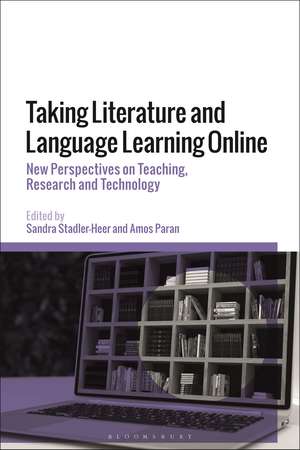Taking Literature and Language Learning Online: New Perspectives on Teaching, Research and Technology
Editat de Dr Sandra Stadler-Heer, Professor Amos Paranen Limba Engleză Hardback – 16 noi 2022
| Toate formatele și edițiile | Preț | Express |
|---|---|---|
| Paperback (1) | 192.30 lei 6-8 săpt. | |
| Bloomsbury Publishing – 29 mai 2024 | 192.30 lei 6-8 săpt. | |
| Hardback (1) | 569.87 lei 6-8 săpt. | |
| Bloomsbury Publishing – 16 noi 2022 | 569.87 lei 6-8 săpt. |
Preț: 569.87 lei
Preț vechi: 816.56 lei
-30% Nou
Puncte Express: 855
Preț estimativ în valută:
109.07€ • 113.44$ • 91.40£
109.07€ • 113.44$ • 91.40£
Carte tipărită la comandă
Livrare economică 14-28 martie
Preluare comenzi: 021 569.72.76
Specificații
ISBN-13: 9781350268524
ISBN-10: 1350268526
Pagini: 280
Ilustrații: 10 bw illus
Dimensiuni: 156 x 234 mm
Greutate: 0.56 kg
Editura: Bloomsbury Publishing
Colecția Bloomsbury Academic
Locul publicării:London, United Kingdom
ISBN-10: 1350268526
Pagini: 280
Ilustrații: 10 bw illus
Dimensiuni: 156 x 234 mm
Greutate: 0.56 kg
Editura: Bloomsbury Publishing
Colecția Bloomsbury Academic
Locul publicării:London, United Kingdom
Caracteristici
Addresses the timely topic of remote learning in the context of the COVID-19 pandemic and discusses how remote teaching can promote students' language learning.
Notă biografică
Sandra Stadler-Heer is Senior Lecturer of TESOL at the Department of Linguistics and Literature, Catholic University of Eichstätt-Ingolstadt, Germany.Amos Paran is Professor of TESOL at IOE, UCL's Faculty of Education and Society, University College London, UK.
Cuprins
Introduction, Amos Paran (Institute of Education, University College London, UK) and Sandra Stadler-Heer (Catholic University Eichstätt-Ingolstadt, Germany)Part I: Literary Responses in Times of Crisis1. Literary Narratives as Recordings of the Pandemic Present: The New York Times Magazine's Decameron Project, Ingrid Gessner (University College of Teacher Education Vorarlberg, Austria)2. Pandemic Literature: What It Is, Why It Should Be Taught and How, Engelbert Thaler (University of Augsburg, Germany)II. Researching and Teaching Literature for/to Young Learners 3. Identifying Quality in Asynchronous, Pre-recorded Picturebook Read-Alouds for Children Learning English as a Foreign Language, Gail Ellis (Independent Researcher, France) and Sandie Mourão (Universidade Nova de Lisboa, Portugal)4. Digital Picturebooks in Times of Crisis: From Picturebooks about the Coronavirus to Developing Critical Environmental Literacies, Theresa Summer (University of Würzburg, Germany)III. Researching and Teaching Literature in Online Teacher Education 5. Exploiting the Educational Potential of Literature in English Language Teaching: Continuity and Change in Digital Literature Teaching, Christine Gardemann (University of Bielefeld, Germany)6. Conducting Story-based Activities in Times of Social Distancing, Annett Kaminski (University of Koblenz-Landau, Germany)IV. Tools and Concepts for Teaching Literature Online7. Implementing a Collaborative Reading Project Online: Solutions for a Pedagogically Meaningful Virtual Workshop, Jennifer Schumm Fauster (University of Graz, Austria)8. Digital Storytelling as a Pedagogical Approach for Meaningful Learning: Alternative Implementations of Technology in the Libyan EFL Context, Fatma Abu-Baker (University of Edinburgh, UK) and Hana A. El-Badri (University of Benghazi, Lybia)9. Simple and Engaging Fiction for Adult Beginners, Pedro Malard Monteiro (Universidade Federal de Uberlandia, Brazil), Margaret Wilkinson (Newcastle University, UK) and Martha Young-Scholten (Newcastle University, UK)10. Annotating Literary Texts on Conceptboard: Philological Practice in the Digital Classroom, Verena Laschinger (University of Erfurt, Germany)11. Writing the Future -Collaborative Creative Science-Fiction Writing in the Virtual EFL Classroom, Christian Ludwig and Elizabeth Shipley (University of Karlsruhe, Germany)Afterword: Closing Reflections on the Brave New World of Literature and Language Education Online, Geoff Hall (University of Nottingham-Ningbo, China) References
Recenzii
This novel, timely and interesting volume explores the nexus of literature and foreign language learning, and more importantly their interconnectedness throughout the move to online publishing and teaching arising from the Covid-19 pandemic. Online interaction is at the heart of the volume, and the role literature and art more broadly have played in reminding learners and teachers alike 'why life is worth living' (Ben Okri, p.1) during the dark days of the pandemic. Yet although the volume is very deeply rooted in 2020 and subsequent years, the messages coming out of it have relevance beyond that period, for both language practitioners and researchers. Rather than just presenting the challenges posed for engagement with literature by online teaching, learning and publishing, the volume invites the reader to consider the many affordances of the digital world. In so doing it will be of interest to all those concerned with language education in the broadest sense, from the early years of schooling through to teacher education and publishing.
The volume provides very interesting insights into a timely topic from a variety of perspectives. Student and practicing teachers will find a wealth of ideas for classroom activities as well as theoretical considerations.
The volume provides very interesting insights into a timely topic from a variety of perspectives. Student and practicing teachers will find a wealth of ideas for classroom activities as well as theoretical considerations.
